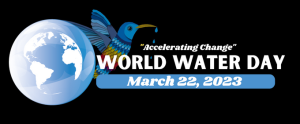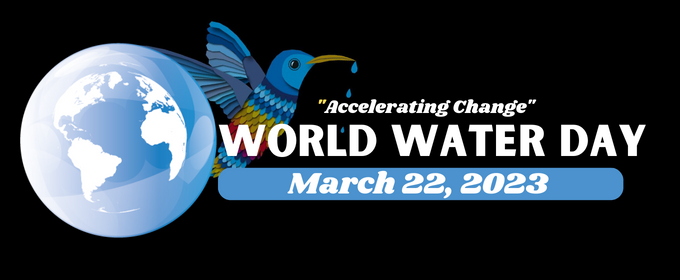 [With AI contribution from Bard.]
[With AI contribution from Bard.]
World Water Day 2023: A Call to
Action (https://www.worldwaterday.org/).
Act like the humming bird, be
the change you want to see in the world.
Approximately 750m people worldwide
do not have ready access to clean water. Double that for people without clean
septic/sanitation. The health and wellness of these 2b people can be improved
dramatically with clean water and safe septic.
World Water Day is observed on March
22 each year to raise awareness of the importance of water and to advocate for
the sustainable management of freshwater resources. This year’s theme is
“Accelerating change.” This means that we need to take action to
address the water crisis. We need to find ways to use water more efficiently,
and we need to protect our water resources.
Water is essential for life. It is
used for drinking, bathing, cooking, cleaning, and irrigation. Water is also
essential for the environment. It provides habitat for plants and animals, and
it helps to regulate the climate.
However, water is a finite resource.
The world’s population is growing, and the demand for water is increasing.
Climate change is also causing changes in the distribution of water. These
factors are putting a strain on the world’s water resources.
There are many things that you can
do to help accelerate change on World Water Day. You can:
- Turn off the faucet when you brush your teeth.
- Take shorter showers.
- Fix any leaks in your home.
- Plant a tree.
- Donate to a water charity.
These are just a few examples of
things that you can do to make a difference on World Water Day. Together, we
can accelerate change and create a more sustainable future for our planet.
In addition to the above, you can
also:
- Educate yourself and others about the water crisis.
- Support organizations that are working to address the
water crisis. - Contact your elected officials and urge them to take
action on the water crisis. - Make changes in your own life to reduce your water
consumption.
By taking these actions, you can
help to make World Water Day 2023 a success. Together, we can accelerate change
and create a more sustainable future for our planet.
Water Related Charities
There are many great water-related
charities, but here are a few of the best (CharityNavigator ratings):
- Charity:Water is a non-profit organization that
provides clean water to people in developing countries. (91, 4 Star) - Water.org is a non-profit organization that works to
ensure everyone has access to safe water and sanitation. (95, 4 Star) - WaterAid is a non-profit organization that provides
clean water, sanitation, and hygiene education in developing countries. (91,
4 Star) - The Thirst Project is a non-profit organization that
builds wells in developing countries. (80, 3 Star) - Planet Water Foundation is a non-profit organization
that provides water filters and sanitation solutions in developing
countries. (79, 3 Star) - The Safe Water Network is a non-profit organization
that provides water filtration systems in developing countries. (93, 4
Star)
These charities are all doing
important work to help people around the world have access to clean water. If
you are looking for a way to make a difference, consider donating to one of
these charities.
Water and Rotary
Action Groups (WASH-RAG)
Rotary International (100, 4 Star)
and its collection of clubs worldwide take on 7 specific areas of focus
including water and sanitation. Rotary groups help initiate sustainable fresh
water and sanitation projects. (Rotary has almost 40,000 clubs worldwide in
more than 200 countries.)
WASH-RAG is a group of Rotarians who
are committed to helping Rotary clubs effectively plan, finance, implement,
monitor, and evaluate water, sanitation, and hygiene programs. WASH-RAG
operates in accordance with Rotary International policy but is not an agency
of, or controlled by, Rotary International.
WASH-RAG provides a variety of
resources to Rotarians, including:
- Information on water, sanitation, and hygiene projects
- Tools and templates to help Rotarians plan and
implement projects - Training and support to help Rotarians evaluate
projects - Access to a network of Rotarians who are working on
water, sanitation, and hygiene projects
WASH-RAG is a valuable resource for
Rotarians who are looking to make a difference in the lives of people around
the world. By working together, Rotary clubs can help to create a more sustainable
future for our planet.
Clean Water Saves
Lives
According to the World Health
Organization, an estimated 2.2 million people die each year from diarrheal diseases,
which are caused by a lack of clean water and sanitation. If everyone had
access to clean water and sanitation, it is estimated that 2.2 million lives
could be saved each year.
In addition, clean water and
sanitation are essential for preventing other diseases, such as cholera,
typhoid, and dysentery. These diseases can cause serious illness and even
death, especially in young children.
Therefore, providing clean water and
sanitation to everyone is essential for improving health and saving lives around
the world.
Thanks BARD (from Google) for
assistance with this World Water Day blog post.
#SustainZine.com #NonprofitPlan.org #WaterForLife #BardAI

